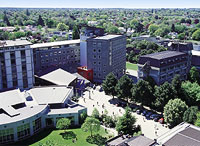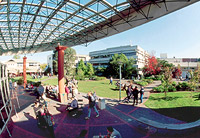Education in New Zealand
New Zealand has a reputation as a provider of quality education offering excellent study opportunities and support services in a safe learning environment. It is fast becoming a popular choice for international students seeking high quality education away from home.

Academic, profession and vocation studies are offered at universities, polytechnics, colleges of education, secondary schools and private training establishments. A number of English Language Institutes and private English Language Schools are also throughout the country.
New Zealand's national education system is based on the British system. Research indicates New Zealand students are ranked amongst the top in the world academically.
All New Zealand's international student education providers are required to be signatories to the Code of Practice for the Pastoral Care of International Students. The code is a document introduced in 2002 designed to ensure all signatories provide a high standard of pastoral care to meet the needs of international students studying in New Zealand. See the Ministry of Education Web site to view more information on the code.
English Language Schools
A number of English Language Institutes and private English Language Schools are located throughout the country.
International students in New Zealand are taught in an English speaking environment, where they are required to actively participate in class discussions and activities, with the aim to become fluent and comfortable with the use of everyday English.
View more information on education for international students in New Zealand.
High School/Secondary School

High school in New Zealand usually begins at 13 years of age beginning at the year nine level. Core subjects are offered during year nine and 10 - English or Māori, Science, Mathematics, Social Studies and Physical Education. Generally a couple of elective subjects are also taken.
To understand the schooling system in New Zealand, the Ministry of Education has published a guide to schooling which looks at what schools teach and how schools are run.
Students begin the National Certificate of Achievement (NCEA) in Year 11, working towards a qualification to gain entry into their tertiary institution of choice.
NCEA is a new national qualification for New Zealand secondary school students. Implemented throughout New Zealand schools in 2002, NCEA is the current path to tertiary education.
Many schools in New Zealand have been experiencing an increase in the number of students that come from a non English speaking background. These students help bring diversity to a school, and add awareness to a school learning environment.
University
New Zealand has a selection of 8 national universities with a great range of subjects in commerce, science and arts. Specialist subjects are offered at each university.
Most universities offer a foundation year programme to international students designed to provide the necessary preparation before beginning undergraduate study.

View more information on New Zealand's universities:
- Auckland University
- Auckland University of Technology
- Waikato Univeristy
- Massey University
- Victoria University
- University of Canterbury
- Lincoln University
- Otago University
Polytechnics
New Zealand Polytechnics and Institutes of Technology give a more hands on approach to learning providing degrees, diplomas and certificate level qualifications.
View more information on New Zealand's Polytechnics and Institutes of Technology:

- The Open Polytechnic of New Zealand
- Universal College of Learning
- Northland Polytechnic
- Waiariki Institute of Technology
- Manukau Institute of Technology
- Tai Poutini Polytechnic
- Tairawhiti Polytech
- Bay of Plenty Polytechnic
- Waikato Institute of Technology
- Western Institute of Technology
- Whitireia Community Polytechnic
- Wellington Institute of Technology
- Eastern Institute of Technology
- Nelson Marlborough Institute of Technology
- Christchurch Polytechnic Institute of Technology
- Otago Polytechnic
- Southern Institute of Technology
New Zealand is continually seeking to improve the quality of education and opportunities offered to international students studying here. Besides education, New Zealand offers a lifestyle second to none. So why not develop new skills while exploring new cultures and entertainment opportunities?
What's it like in New Zealand?
New Zealand Culture
New Zealand culture is unique and dynamic. The culture of its indigenous Māori people affects the language, the arts, and even the accents of all New Zealanders. Their place in the South Pacific, and their love of the outdoors, sport, and the arts make New Zealanders and their culture unique in the world. A walk around any New Zealand city today shows what a culturally diverse and fascinating country we have become. View more information on New Zealand culture.
New Zealand History
New Zealand history although relatively young, is both rich and fascinating, reflecting both our Māori and European heritage. Amazing Māori historic sites and taonga (treasures), some dating back almost a thousand years, are a contrast to many beautiful colonial buildings. View more information on New Zealand history.
New Zealand Weather
New Zealand weather lacks the extremes one finds in most continental climates. Because New Zealand lies in the Southern Hemisphere, the average temperature decreases as you travel south. The north of New Zealand is subtropical and the south temperate. The warmest months are December, January and February, and the coldest June, July and August. In summer, the average maximum temperature ranges between 20-30ºC and in winter between 10-15ºC. View more information on New Zealand weather.
View more key facts and information about New Zealand.













